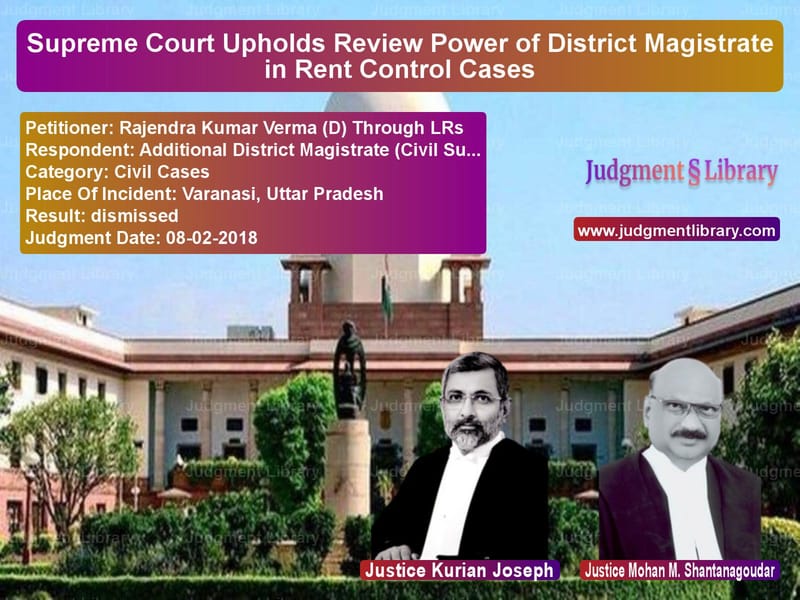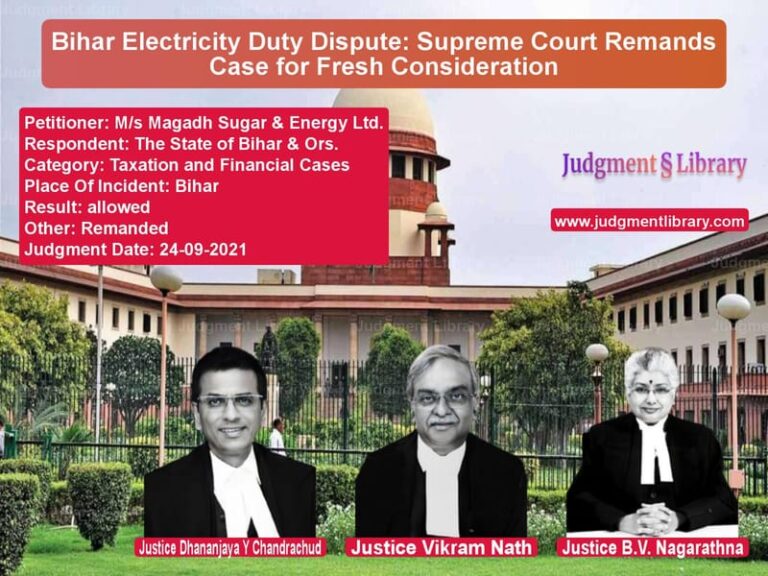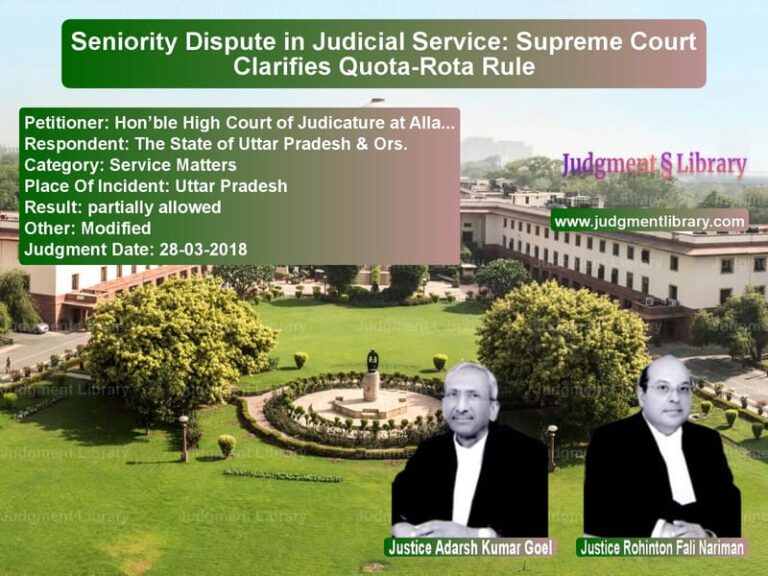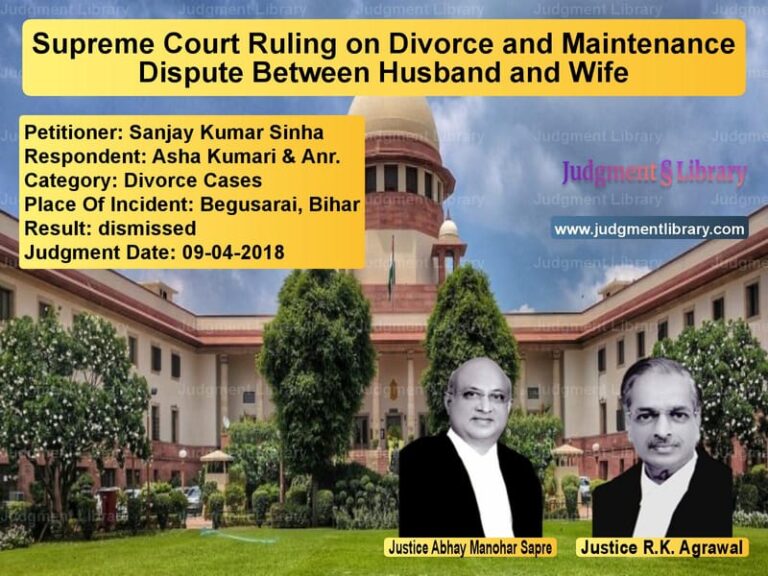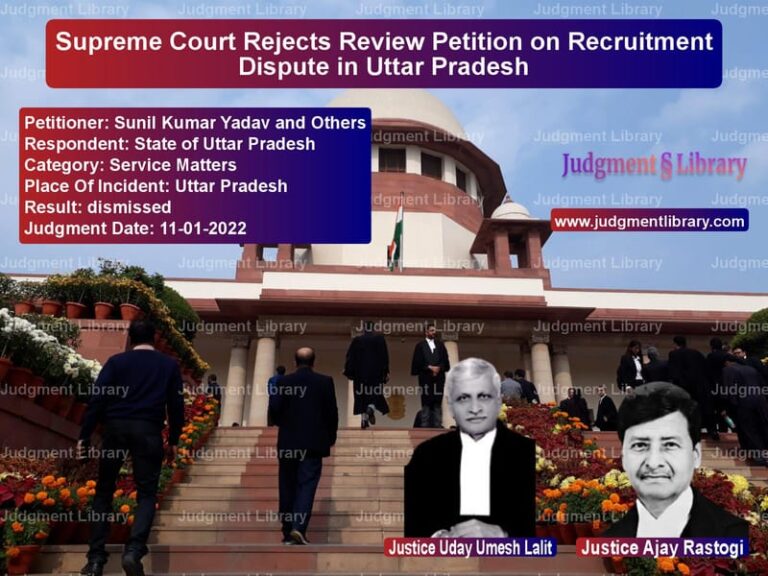Supreme Court Upholds Review Power of District Magistrate in Rent Control Cases
The Supreme Court of India recently ruled in Rajendra Kumar Verma (D) Through LRs v. Additional District Magistrate (Civil Supplies) & Ors., addressing a significant question regarding the scope of review under Section 16(5)(a) of the Uttar Pradesh Urban Buildings (Regulation of Letting, Rent, and Eviction) Act, 1972. The Court upheld the review power of the District Magistrate concerning orders on building vacancy, emphasizing the importance of procedural fairness in rent control matters.
Background of the Case
The case arose from a dispute over a rented premises under the U.P. Urban Buildings (Regulation of Letting, Rent, and Eviction) Act, 1972. The primary issue was whether a review under Section 16(5)(a) could be entertained in respect of an order declaring a building vacant.
The District Magistrate had declared a building vacant, paving the way for its allotment. The landlord, dissatisfied with the vacancy order, sought review under Section 16(5)(a). The case went through multiple rounds of litigation, culminating in an appeal before the Supreme Court.
Key Legal Issues
- Whether an order regarding vacancy under Section 16(1) can be reviewed under Section 16(5)(a).
- Whether the review mechanism serves the broader purpose of the Rent Control Act.
- The scope of the District Magistrate’s powers in reviewing his own orders.
Arguments Presented
Petitioners (Rajendra Kumar Verma & LRs)
The petitioners contended:
- Review under Section 16(5)(a) was limited to orders of allotment or release, not to vacancy declarations.
- Once a building is declared vacant, any review should be sought through an appeal rather than a review petition.
- The District Magistrate’s review order was beyond his jurisdiction.
Respondents (State Authorities & Tenants)
The respondents argued:
- The finding of vacancy is a pre-condition for allotment or release.
- If a vacancy order is incorrect, it directly affects the landlord’s rights and should be open to review.
- The Rent Control Act aims to ensure fairness in letting and eviction matters, and denying review would lead to injustice.
Supreme Court’s Analysis
1. Review Power Under Section 16(5)(a)
The Supreme Court examined the wording and intent of Section 16 of the Rent Control Act, stating:
“The whole purpose of Section 16(1) is to regulate the allotment and release of vacant buildings. A finding regarding vacancy is a precondition for an order under Section 16(1)(a) or (b). If we adopt a narrow technical approach and hold that vacancy orders cannot be reviewed, it would defeat the purpose of the Act.”
2. Vacancy as a Pre-Condition for Allotment or Release
The Court emphasized that the vacancy determination is fundamental to the allotment or release process. If an incorrect vacancy declaration is allowed to stand without review, it could cause irreparable harm. The judgment observed:
“The whole purpose of Section 16(5)(a) is to see whether the District Magistrate has passed a lawful order in the matter of either allotment or release. If a wrong finding on vacancy is given, the same should be subject to review.”
3. Legislative Intent and Judicial Interpretation
The Court ruled that the interpretation of the Act must align with its objective of ensuring just and fair administration of rent control laws. It observed:
“The legislative intent behind providing a review mechanism under Section 16(5)(a) is to correct erroneous orders. The denial of such a review would make the process unfair and contrary to the scheme of the Act.”
4. Parallel Civil Suit and Its Impact
The Supreme Court noted that a related civil suit (Suit No. 375 of 1981) was pending in the II Additional Civil Judge, Varanasi, concerning the cancellation of a sale deed executed by the landlord’s son in favor of the appellants. Since the property in question was also part of this suit, the Court found it necessary to ensure consistency in legal proceedings.
Supreme Court’s Verdict
The Supreme Court ruled:
- The review petition under Section 16(5)(a) was maintainable.
- The District Magistrate had the power to correct an erroneous vacancy order.
- The High Court’s decision upholding the review jurisdiction was correct.
- The pending civil suit (Suit No. 375 of 1981) should be expedited and decided within six months.
- Until the final decision in the civil suit, the status quo regarding possession of the premises should be maintained.
Implications of the Judgment
The ruling has significant implications for rent control litigation:
- Strengthening Fair Review Mechanisms: The judgment confirms that incorrect vacancy orders can be reviewed to prevent injustice.
- Ensuring Procedural Fairness: The ruling aligns with the broader purpose of the Rent Control Act, ensuring fair treatment for landlords and tenants.
- Clarification on District Magistrate’s Powers: The decision provides clarity on the scope of the District Magistrate’s review powers, preventing unnecessary legal disputes.
- Impact on Future Rent Control Cases: The ruling serves as an important precedent for similar cases across Uttar Pradesh and other states with similar rent control laws.
Conclusion
The Supreme Court’s decision in Rajendra Kumar Verma (D) Through LRs v. Additional District Magistrate (Civil Supplies) & Ors. upholds the review power of the District Magistrate in rent control matters. By affirming the maintainability of a review petition against erroneous vacancy declarations, the Court has ensured fairness in the application of the Rent Control Act. This ruling will serve as a guiding precedent for future rent control disputes in India.
Petitioner Name: Rajendra Kumar Verma (D) Through LRsRespondent Name: Additional District Magistrate (Civil Supplies) & Ors.Judgment By: Justice Kurian Joseph, Justice Mohan M. ShantanagoudarJudgment Date: 08-02-2018
Don’t miss out on the full details! Download the complete judgment in PDF format below and gain valuable insights instantly!
Download Judgment: Rajendra Kumar Verma vs Additional District Supreme Court of India Judgment Dated 08-02-2018.pdf
Direct Downlaod Judgment: Direct downlaod this Judgment
See all petitions in Landlord-Tenant Disputes
See all petitions in Property Disputes
See all petitions in Specific Performance
See all petitions in Judgment by Kurian Joseph
See all petitions in Judgment by Mohan M. Shantanagoudar
See all petitions in dismissed
See all petitions in supreme court of India judgments February 2018
See all petitions in 2018 judgments
See all posts in Civil Cases Category
See all allowed petitions in Civil Cases Category
See all Dismissed petitions in Civil Cases Category
See all partially allowed petitions in Civil Cases Category

